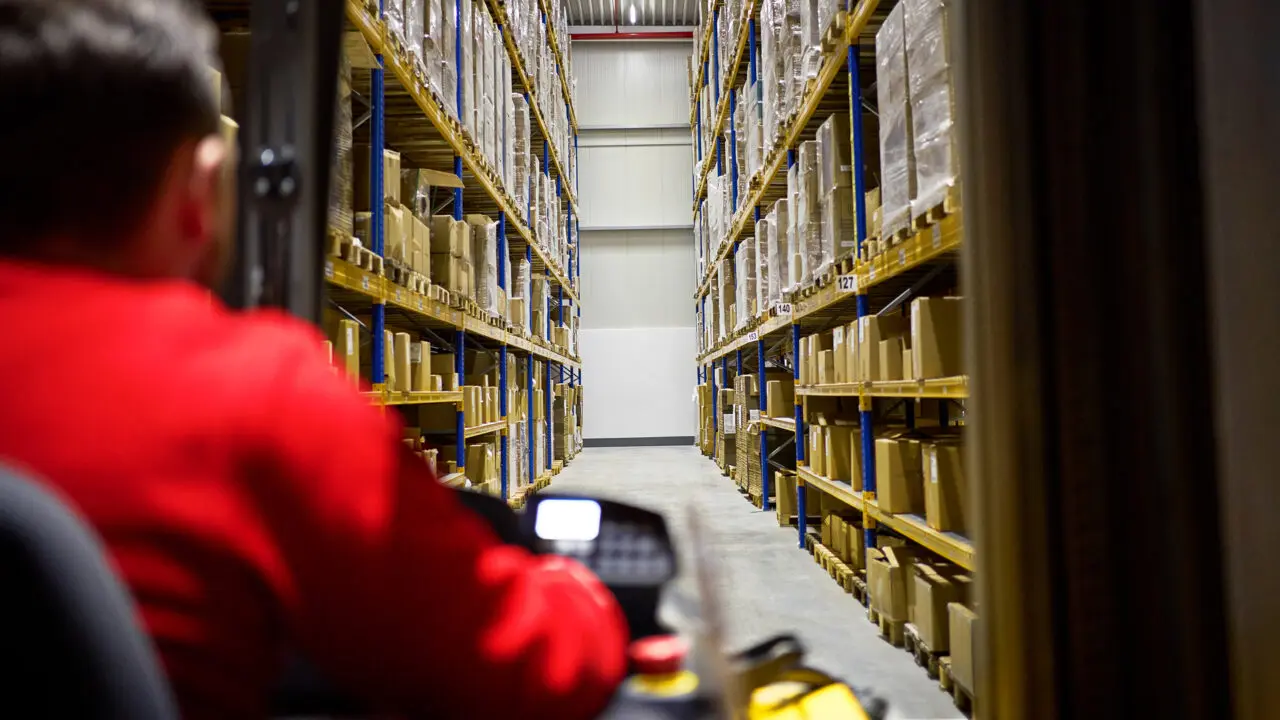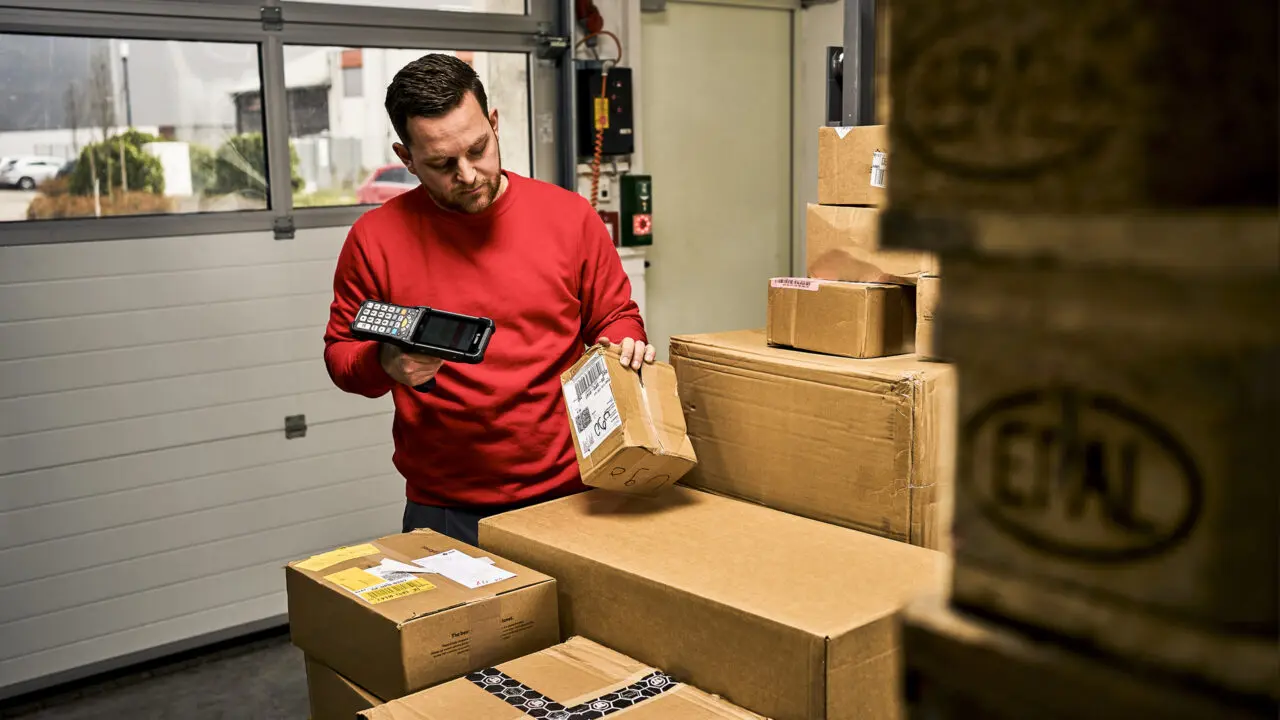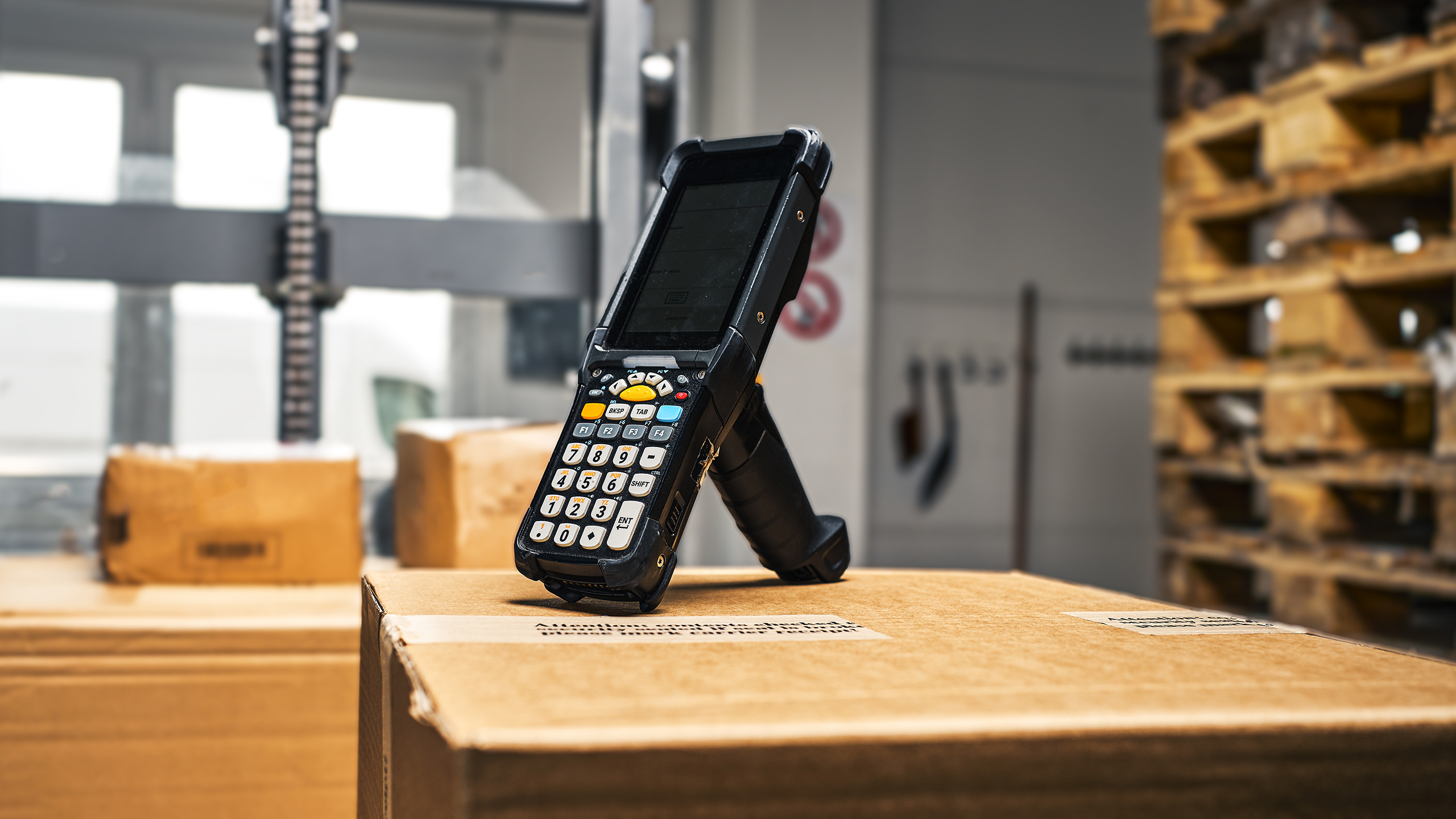Tailwind instead of stress in shipping: With RHIEM as your 3PL fulfillment partner, you optimize your supply chain, create space to scale your eCommerce success and can concentrate fully on your business
What does “3PL Fulfillment” mean?
3PL Fulfillment stands for “Third-Party Logistics Fulfillment” and refers to a form of logistics service in which a company (e.g. an online store) outsources the storage, shipping and handling of its products to a third-party provider, such as RHIEM. This third-party provider, known as a 3PL, takes responsibility for the various aspects of the supply chain so that the retailer can focus on its core business.
The services offered by a 3PL provider can be diverse and typically include:

Storage
Storage space is provided to store the client’s or fulfillment customer’s products.

Inventory management
Monitor & manage inventory to ensure that products are always available and that overstocks or shortages are avoided.

Order processing
This includes picking, packing and dispatching orders to customers.

Inventory management
Monitor & manage inventory to ensure that products are always available and that overstocks or shortages are avoided.

Returns management
Returns and exchange processes are handled directly by 3PL companies.
3PL Fulfillment – with RHIEM as your fulfillment partner, you have your head and hands free to concentrate on your core business!
Thus, 3PL fulfillment companies like RHIEM offer a number of advantages that allow an e-commerce store to focus on its core business, reduce costs, improve scalability and gain access to specialized logistics resources and technologies. It is particularly useful for companies that do not want to or cannot maintain their own extensive logistics and storage capacities.
In addition to the most suitable 3PL fulfillment for companies, there are also 3 other fulfillment options:
When you do everything yourself: “1PL Fulfillment”
The term “1PL Fulfillment” refers to “First-Party Logistics Fulfillment” and describes the situation in which a company manages its own logistics and goods processing internally, completely dispensing with the services and expertise of an external logistics service provider. In this scenario, the company itself handles all aspects of logistics, storage, goods movement, inventory management and the shipping of its products to customers.
This can occur in various industries and business models, especially in smaller companies or those that have the resources and infrastructure to handle these tasks internally.
The lack of staff and the ability to deploy staff flexibly is also a challenge – if a retailer handles logistics itself, employees often have too much to do on Monday and less work on Friday. A 3PL can compensate for such peaks and fluctuations more easily.
1PL fulfillment is usually associated with higher internal costs, as the company handles all logistics-related tasks itself. The choice between 1PL and 3PL therefore often depends on individual company goals, resources and capacities.
In contrast to the 3PL, where a specialized third-party provider provides the logistics services, the 1PL model is designed so that the company is directly responsible for the entire supply chain and logistics. The company owns and operates its own warehouses, distribution centers and logistics systems to process orders and deliver products to customers.
It is important to note that 1PL is less commonly used as a term. Terms such as “internal fulfillment” or “in-house logistics” tend to be used here to describe when a company manages its own logistics and goods processing without using external logistics service providers.
Growing your own company: “2PL Fulfillment”
The term “2PL Fulfillment” refers to “Second-Party Logistics Fulfillment” and describes a form of logistics in which two main parties are involved in the supply chain: the manufacturer/seller and a selected logistics service provider. In the 2PL model, the company that manufactures or sells the products works closely with a specialized logistics service provider to organize and optimize the storage, processing and shipping of the products.
The logistics service provider takes care of warehousing, inventory management, order processing and shipping, allowing the company to concentrate on manufacturing and marketing its products.
Simply put, the logistics provider in 2PL fulfillment can also be just the usual parcel shipper who simply delivers the store operator’s orders to its customers.
The big picture: “4PL Fulfillment”
The term “4PL Fulfillment” refers to “Fourth-Party Logistics Fulfillment” and represents an expanded concept of logistics services that goes beyond conventional models such as 1PL, 2PL and 3PL. A 4PL provider acts as an overarching logistics service provider that not only manages physical logistics (such as warehousing and shipping) but also plays a broader role in the entire supply chain.
In contrast to a 3PL provider that performs logistics services, a 4PL provider can be seen as an external partner that makes strategic decisions and coordinates between different 3PL companies and other service providers in the supply chain.
A 4PL provider takes on a strategic and overarching role that goes beyond the purely operational aspects of logistics. This model is relevant for companies that require more comprehensive logistics support and management and want to manage the complexity of their supply chain through an external partner.

Strategic planning and consulting
Development of long-term logistics strategies, optimization of the supply chain and provision of consulting services

Coordination of service providers
Management and coordination of various 3PL providers and other service providers in the supply chain to ensure efficiency and integration.

Strategic planning and consulting
Development of long-term logistics strategies, optimization of the supply chain and provision of consulting services

Coordination of service providers
Management and coordination of various 3PL providers and other service providers in the supply chain to ensure efficiency and integration.
Why 3PL Fulfillment is the most successful form of supply chain optimization for eCommerce companies
3PL (Third-Party Logistics) fulfillment has proven to be extremely beneficial for many e-commerce companies and is considered a successful form of supply chain optimization for several reasons:
Why 3PL Fulfillment is the most successful form of supply chain optimization for eCommerce companies
3PL (Third-Party Logistics) fulfillment has proven to be extremely beneficial for many e-commerce companies and is considered a successful form of supply chain optimization for several reasons:
Specialized expertise
3PL providers have the expertise and resources to overcome complex logistical challenges. You know the best practices and have experience in handling warehousing, inventory management and shipping.
Scalability
For eCommerce companies that experience fluctuations depending on season or demand, 3PL service providers offer flexibility and scalability. They can adapt to changing requirements, whether due to seasonal peaks or sudden increases in order volumes.
Cost efficiency
By outsourcing logistics to a 3PL provider, companies can reduce the costs associated with operating their own warehouses and logistics infrastructure. 3PL service providers can often benefit from economies of scale and more efficient processes to achieve lower overall costs.
Focus on the core business
By outsourcing logistics activities, eCommerce companies can focus their resources and time on their core business, such as product development, marketing and customer service.
Global reach
Many 3PL providers have an international presence and give eCommerce companies access to a global logistics network, which in turn increases the reach and efficiency of their supply chains.
Technological integration
Modern 3PL providers use advanced technology to enable real-time tracking, inventory management and reporting, which helps companies manage and optimize their supply chain more effectively.

Keep your head & hands free to scale your online business with RHIEM & 3PL Fulfillment
RHIEM Services GmbH is a family-run company that has been in existence for over 50 years and offers fulfillment and logistics services depending on your specific requirements and objectives.
Logistical expertise
RHIEM has decades of expertise and experience in logistics and goods handling. We can implement best practices to ensure your products are stored efficiently and shipped to your customers on time.
B2C and B2B logistics from a single setup
B2B logistics in particular can be somewhat complex. RHIEM can provide both from a single source and has expertise in supplying many distributors.
Scalable fulfillment
RHIEM is able to scale up at any time in the event of increasing demand or seasonal fluctuations. This allows us to react quickly to changes in your order volume without having to invest in expensive logistics infrastructure.
IFS certification
Thanks to our IFS certification, RHIEM can guarantee seamless batch traceability. Which batch went to which customer can be reported at the touch of a button. Many large distributors see this as a must-have.
Individual processes
RHIEM offers individual processes in the various shipping areas. It’s not just about the way parcels are packed in B2C. Individual packing schemes in B2B can also be implemented, as can individual returns processes and complex assemblies.
Technology & Integration
RHIEM offers modern technologies and systems to effectively monitor and optimize your supply chain. Of course, this also includes real-time tracking and inventory management.
Conclusion – the perfect fulfillment for your requirements
Whether 3- or 4PL fulfillment, RHIEM is your reliable partner for stress-free and easy-to-use fulfillment in your eCommerce business. Thanks to our decades of experience in the sector, our technological progress and our infrastructure in the heart of the Ruhr region, we are the perfect partner for eCommerce companies with scaling requirements. Let’s conquer your market together now!





